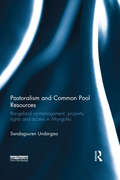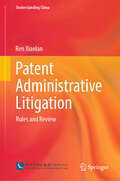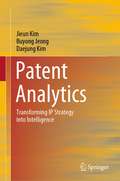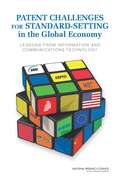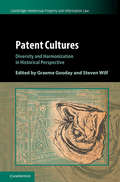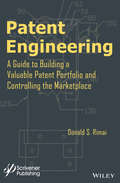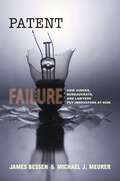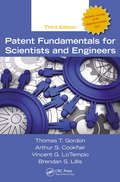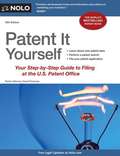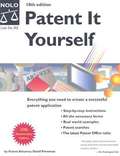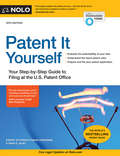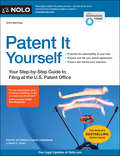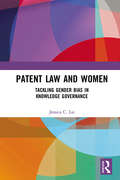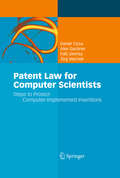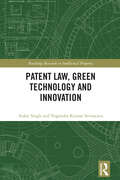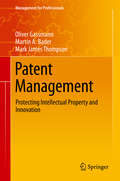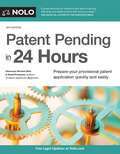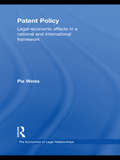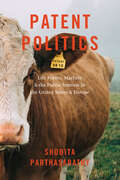- Table View
- List View
Pastoralism and Common Pool Resources: Rangeland co-management, property rights and access in Mongolia
by Sandagsuren UndargaaThe grazing of animals on common land and associated property rights were the original basis of the concept of "the tragedy of the commons". Drawing on the classic work of Elinor Ostrom and the readings of political ecology, this book questions the application of exclusive property rights to mobile pastoralism and rangeland resource governance. It argues that this approach inadequately represents property relations in the context of Mongolian pastoralism. The author presents an in-depth exploration and analysis of mobile pastoral production and resource management in Mongolia. The country is widely considered to be a prime example of successful and resilient common pool resource management, but now faces a dilemma as policy advocates attempt to adjust historical pastoralism to a modern property regime framework. The book strengthens understanding of the complex and multilateral considerations involved in natural resource governance and management in a mobile pastoralist context. It considers the implications for common pool resource management and pastoral societies in Africa, Russia and China and includes recommendations for formulating national policy.
Patent Administrative Litigation: Rules and Review (Understanding China)
by Ren XiaolanThis book summarizes around 200 most recent patent administrative litigation cases concluded by the Intellectual Property Court of the Supreme People's Court of China in the form of restatements. It discusses the similarities and differences in claim construction, full disclosure, definiteness of claims, nature of reexamination and ex officio review in the context of recent patent administrative litigation cases. It is conducive to the implementation of unified review standards and achievement of a fair trial by using typical cases as guidance in the application of patent law. This book could be used as a reference book for judges, researchers, and practitioners.
Patent Analytics: Transforming IP Strategy into Intelligence
by Jieun Kim Buyong Jeong Daejung KimThrough the prisms of a data scientist, a patent attorney, and a designer, this book demystifies the complexity of patent data and its structure and reveals their hidden connections by employing elaborate data analytics and visualizations using a network map. This book provides a practical guide to introduce and apply patent network analytics and visualization tools in your business. We incorporate case studies from renowned companies such as Apple, Dyson, Adobe, Bose, Samsung and more, to scrutinise how their underlying values of patent network drive innovation in their business. Finally, this book advances readers’ perspective of patent gazettes as big data and as a tool for innovation analytics when coupled with Artificial Intelligence.
Patent Assertion Entities and Competition Policy
by Sokol D. DanielPatent Assertion Entities (commonly known as 'patent trolls') hurt competition and innovation. This book, the first to analyze the most salient issues related to Patent Assertion Entities around the world, integrates economic theory with economic and legal reality to examine how the entities function and their impact on competition. It also offers legal and policy solutions that might be used to combat them. Edited by D. Daniel Sokol, the volume collects chapters from an array of leading scholars who describe Patent Assertion Entities in the United States, Europe, Korea, Taiwan, Japan, and China, while offering empirical accounts of the entities' economic consequences and their use of litigation as a means of legal extortion against many of the most innovative companies in the world, from startups to multinationals. It should be read by anyone interested in how Patent Assertion Entities operate and how they might be stopped.
Patent Challenges for Standard-Setting in the Global Economy
by Keith MaskusPatent Challenges for Standard-Setting in the Global Economy: Lessons from Information and Communication Technology examines how leading national and multinational standard-setting organizations (SSOs) address patent disclosures, licensing terms, transfers of patent ownership, and other issues that arise in connection with developing technical standards for consumer and other microelectronic products, associated software and components, and communications networks including the Internet. Attempting to balance the interests of patent holders, other participants in standard-setting, standards implementers, and consumers, the report calls on SSOs to develop more explicit policies to avoid patent holdup and royalty-stacking, ensure that licensing commitments carry over to new owners of the patents incorporated in standards, and limit injunctions for infringement of patents with those licensing commitments. The report recommends government measures to increase the transparency of patent ownership and use of standards information to improve patent quality and to reduce conflicts of laws across countries.
Patent Cultures: Diversity and Harmonization in Historical Perspective (Cambridge Intellectual Property and Information Law #52)
by Graeme Gooday Steven WilfThis book explores how dissimilar patent systems remain distinctive despite international efforts towards harmonization. The dominant historical account describes harmonization as ever-growing, with familiar milestones such as the Paris Convention (1883), the World Intellectual Property Organization's founding (1967), and the formation of current global institutions of patent governance. Yet throughout the modern period, countries fashioned their own mechanisms for fostering technological invention. Notwithstanding the harmonization project, diversity in patent cultures remains stubbornly persistent. No single comprehensive volume describes the comparative historical development of patent practices. Patent Cultures: Diversity and Harmonization in Historical Perspective seeks to fill this gap. Tracing national patenting from imperial expansion in the early nineteenth century to our time, this work asks fundamental questions about the limits of globalization, innovation's cultural dimension, and how historical context shapes patent policy. It is essential reading for anyone seeking to understand the contested role of patents in the modern world.
Patent Engineering: A Guide to Building a Valuable Patent Portfolio and Controlling the Marketplace
by Donald S. RimaiPatents are a vital asset in the modern business world. They allow patent holders to introduce new products in to a market while deterring other market players from simply copying innovative features without making comparable investments in research and development. In years past, a few patents may have provided adequate protection. That is no longer the case. In today's world, it is critical that innovative companies protect the features of their products that give them a competitive advantage with a family or portfolio of patents that are strategically generated to protect the market position of the patent holder. A patent portfolio that deters competitors from introducing competitive products in a timely manner can be worth billions of dollars. Anything less than this is an expensive and possibly fatal distraction. This book provides a strategic framework for cost efficient engineering of patent portfolios that protect your investments in research and development and that extend the market advantages that these investments provide.
Patent Failure: How Judges, Bureaucrats, and Lawyers Put Innovators at Risk
by James Bessen Michael J. MeurerIn recent years, business leaders, policymakers, and inventors have complained to the media and to Congress that today's patent system stifles innovation instead of fostering it. But like the infamous patent on the peanut butter and jelly sandwich, much of the cited evidence about the patent system is pure anecdote--making realistic policy formation difficult. Is the patent system fundamentally broken, or can it be fixed with a few modest reforms? Moving beyond rhetoric, Patent Failure provides the first authoritative and comprehensive look at the economic performance of patents in forty years. James Bessen and Michael Meurer ask whether patents work well as property rights, and, if not, what institutional and legal reforms are necessary to make the patent system more effective. Patent Failure presents a wide range of empirical evidence from history, law, and economics. The book's findings are stark and conclusive. While patents do provide incentives to invest in research, development, and commercialization, for most businesses today, patents fail to provide predictable property rights. Instead, they produce costly disputes and excessive litigation that outweigh positive incentives. Only in some sectors, such as the pharmaceutical industry, do patents act as advertised, with their benefits outweighing the related costs. By showing how the patent system has fallen short in providing predictable legal boundaries, Patent Failure serves as a call for change in institutions and laws. There are no simple solutions, but Bessen and Meurer's reform proposals need to be heard. The health and competitiveness of the nation's economy depend on it.
Patent Fundamentals for Scientists and Engineers
by Thomas T. Gordon Arthur S. Cookfair Vincent G. LoTempio Brendan S. LillisThe most significant overhaul of the U.S. patent laws in decades occurred with the recent passage of the Leahy-Smith America Invents Act (AIA). Understanding the law that dictates what a patent is and how a patent is obtained and enforced, and the recent changes through statute or case law litigation presents unique challenges. This third edition o
Patent It Yourself
by David Pressman AttorneyPatent your creation with the world's bestselling guide to patents! Have a world-class idea? Ready to protect your invention from copycats? Then turn to the best resource available -- Patent It Yourself. Attorney David Pressman takes you through the entire patent process, providing scrupulously updated information and clear instructions to help you: determine if you can patent your invention understand patent law evaluate the commercial potential of your idea perform your own patent search file a provisional patent application prepare a formal patent application respond to patent examiners amend an application enforce and maintain your patent market and license your invention Thoroughly updated to reflect the latest changes in intellectual property law, this edition provides the latest U.S. Patent and Trademark Office rules and forms. It includes up-to-date discussions of the new "first to file" rule, which promises to revolutionize patent law. Whether you're new at the inventing game or a grizzled veteran, Patent It Yourself will save you grief, time and money.
Patent It Yourself
by David Pressman Attorney Thomas J. TuytschaeversAttorney David Pressman and updater Thomas Tuytschaevers takes you through the entire patent process, providing scrupulously updated information and clear instructions to help you: determine if you can patent your invention understand patent law evaluate the commercial potential of your idea perform your own patent search file a provisional patent application prepare a formal patent application respond to patent examiners amend an application enforce and maintain your patent market and license your invention Thoroughly updated to reflect the latest changes in intellectual property law, this edition provides the latest U.S. Patent and Trademark Office rules and forms. It includes up-to-date discussions of the new "first to file" rule, which has to revolutionized patent law.
Patent It Yourself (10th edition)
by David PressmanPressman, a patent attorney and inventor, offers a guide to the patent process. He explains what patents and other intellectual property are, each step in the process of obtaining a US patent, how and when to file an application, how to document an invention, and requirements and procedures abroad, and provides reproducible and downloadable forms. He also discusses alternative and supplementary forms of protection, such as trade secrets, copyrights, trademarks, and unfair competition law, as well as how to commercially evaluate, market, and license an invention. This edition includes the latest US Patent and Trademark Office rules and forms and covers electronic filing, combination inventions, and other changes to technical filing rules. It covers recent court cases, termination of the PTO's Document Disclosure Program, the lack of patentability of transitory electronic signals, free patent searching systems, new forms, claiming copyright in a specification or drawing, new rules regarding claims limitations and continuation applications.
Patent It Yourself: Your Step-by-Step Guide to Filing at the U.S. Patent Office
by David Pressman David E. BlauFor 30 years, Patent It Yourself has guided hundreds of thousands of inventors through the process of getting a patent, from start to finish. Patent attorneys David Pressman and Thomas J. Tuytschaevers provide the latest information, forms, and clear instructions to help you: conduct a patent search the right way evaluate your idea’s commercial potential file a provisional patent application to get “patent pending” status prepare a patent application focus on your patent application’s claims respond to patent examiners get your drawings done right protect your rights in foreign countries deal with infringers, and market and license your invention. Thoroughly updated to reflect the latest changes in intellectual property law, this edition provides the latest U.S. Patent and Trademark Office rules and forms. The 18th edition covers the latest implications of the first-to-file rules created by the America Invents Act.
Patent It Yourself: Your Step-by-Step Guide to Filing at the U.S. Patent Office
by David Pressman David E. BlauProtect and profit from your invention For 35 years, Patent It Yourself has guided hundreds of thousands of inventors through the process of getting a patent, from start to finish. Patent attorneys David Pressman and David E. Blau provide the latest information, forms, and clear instructions to help you: conduct a patent search the right way evaluate your idea’s commercial potential file a provisional patent application to get “patent pending” status prepare a patent application focus on your patent application’s claims respond to patent examiners get your drawings done right protect your rights in foreign countries deal with infringers, and market and license your invention. The 20th edition covers the latest patent filing rule changes, including the most recent implications of the America Invents Act first-to-file rules. With downloadable forms: All essential forms, including a Nondisclosure Agreement, Patent Searcher’s Worksheet, and Design Patent Application are included in the book and are available for download (details inside).
Patent It Yourself: Your Step-by-Step Guide to Filing at the U.S. Patent Office
by David Pressman Thomas TuytschaeversAttorney David Pressman and updater Thomas Tuytschaevers take you through the entire patent process, providing scrupulously updated information and clear instructions to help you: determine if you can patent your invention understand patent law evaluate the commercial potential of your idea perform your own patent search file a provisional patent application prepare a formal patent application respond to patent examiners amend an application enforce and maintain your patent market and license your invention Thoroughly updated to reflect the latest changes in intellectual property law, this edition provides the latest U.S. Patent and Trademark Office rules and forms. It includes up-to-date discussions of the new "first to file" rule, which has to revolutionized patent law.
Patent Law and Women: Tackling Gender Bias in Knowledge Governance
by Jessica C. LaiThis book analyses the gendered nature of patent law and the knowledge governance system it supports. The vast majority of patented inventions are attributed to male inventors. While this has resulted in arguments that there are not enough women working in science, technology, engineering and mathematics, this book maintains that the issue lies with the very nature of patent law and how it governs knowledge. The reason why fewer women patent than men is that patent law and the knowledge governance system it supports are gendered. This book deconstructs patent law to reveal the multiple gendered binaries it embodies, and how these in turn reflect gendered understandings of what constitutes science and an invention, and a scientist and an inventor. Revealing the inherent biases of the patent system, as well as its reliance on an idea of the public domain, the book argues that an egalitarian knowledge governance system must go beyond socialised binaries to better govern knowledge creation, dissemination and maintenance. This book will appeal to scholars and policymakers in the field of patent law, as well as those in law and other disciplines with interests in law, gender and technology.
Patent Law for Computer Scientists
by Jörg Machek Daniel Closa Alex Gardiner Falk GiemsaPatent laws are different in many countries, and inventors are sometimes at a loss to understand which basic requirements should be satisfied if an invention is to be granted a patent. This is particularly true for inventions implemented on a computer. While roughly a third of all applications (and granted patents) relate, in one way or another, to a computer, applications where the innovation mainly resides in software or in a business method are treated differently by the major patent offices in the US (USPTO), Japan (JPO), and Europe (EPO). The authors start with a thorough introduction into patent laws and practices, as well as in related intellectual property rights, which also explains the procedures at the USPTO, JPO and EPO and, in particular, the peculiarities in the treatment of applications centering on software or computers. Based on this theoretical description, next they present in a very structured way a huge set of case studies from different areas like business methods, databases, graphical user interfaces, digital rights management, and many more. Each set starts with a rather short description and claim of the "invention", then explains the arguments a legal examiner will probably have, and eventually refines the description step by step, until all the reservations are resolved. All of these case studies are based on real-world examples, and will thus give an inexperienced developer an idea about the required level of detail and description he will have to provide. Together, Closa, Gardiner, Giemsa and Machek have more than 70 years experience in the patent business. With their academic background in physics, electronic engineering, and computer science, they know about both the legal and the subject-based subtleties of computer-based inventions. With this book, they provide a guide to a patent examiner's way of thinking in a clear and systematic manner, helping to prepare the first steps towards a successful patent application.
Patent Law, Green Technology and Innovation (Routledge Research in Intellectual Property)
by Ankit Singh Yogendra Kumar SrivastavaIn the era of modern industrial regimes, the role of technology in tackling climate change is pivotal. International goals of climate change mitigation and sustainable development cannot be achieved without the contribution of new technologies. At the same time, the importance of patent protection and an efficient patent system that facilitates technology transfer among international frontiers cannot be overlooked. Many patented technologies are either not accessible for further dissemination or do not hold much technical value. Therefore, advanced systems of collaborative innovation have been developed, especially in the sector of green technology and green innovation. The environmental concerns of the global community cannot be tackled by a single company, person, sector or country. Innovation partnerships and collaborative research will play a vital role in combating global climate concerns and in determining the diffusion of green technologies for maximum impact. This book argues that policy-makers should encourage partnerships in technology rather than focusing on gaining investment and access to green technology to encourage global technological giants to transfer their technology and knowledge to local entities. It analyses the relationship between patent protection, green innovation and diffusion of green technology against the backdrop of climate change and severe climate crisis. Taking an interdisciplinary approach to align patent law and green technology with the Sustainable Development Goals, it examines the effects of patent protection, technology transfer and compulsory licensing on the diffusion of green technologies it offering a systematic analysis of the relationship between patent protection, green innovation and diffusion of green technology from a global perspective.
Patent Management: Protecting Intellectual Property and Innovation (Management for Professionals)
by Oliver Gassmann Martin A. Bader Mark James ThompsonThis book provides an overview of the common concepts and building blocks of patent management. It addresses executives in the areas of innovation, R & D, patent and intellectual property management as well as academics and students.The authors give valuable information on the characteristics of patent and intellectual property management, based on the collaboration with companies and organizations from Europe, China, Japan, Argentina, Brazil, India, Canada and the US.A reference for managers who want to bring information technology innovation with a clear intellectual property strategy to the market. A very readable book. Thomas Landolt, Managing Director, IBMA really comprehensive, all-in book about Patents – strategy, value, management and commercialization. And not forgetting what they are for – foster innovation.Dr. Joerg Thomaier, Head of IP Bayer Group
Patent Markets in the Global Knowledge Economy
by Thierry Madiès Thierry Madiès Dominique Guellec Jean-Claude Prager Dominique GuellecThe development of patent markets should allow for better circulation of knowledge and more efficient allocation of technologies at a global level. However, the beneficial role of patents has recently come under scrutiny by those favouring 'open' innovation, and important questions have been asked, namely: How can we estimate the value of patents? How do we ensure matching between supply and demand for such specific goods? Can these markets be competitive? Can we create a financial market for intellectual property rights? In this edited book, a team of authors addresses these key questions to bring readers up to date with current debates about the role of patents in a global economy. They draw on recent developments in economic analysis but also ground the discussion with the basics of patent and knowledge economics. Striking a balance between institutional analysis, theory and empirical evidence, the book will appeal to a broad readership of academics, students and practitioners.
Patent Pending in 24 Hours
by Richard Stim David PresmanEverything you need to protect your invention now The provisional patent application (PPA) is a quick, inexpensive and legal way to claim your invention--and buy yourself time to determine whether it's worthwhile to pursue a regular patent. Learn how to: conduct a patent search online complete all the necessary forms evaluate potential hurdles prepare informal drawings file your application, and file a new PPA to reflect modifications. The book also includes important legal forms to help you preserve your rights when showing or selling your invention: nondisclosure agreement patent assignment prototype-maker agreement joint-ownership agreement The 7th edition incorporates changes from the "America Invents Act," as well as recent revisions to patent rules and regulations. Thousands of people have used Patent Pending in 24 Hours successfully. You can, too!
Patent Pending in 24 Hours
by Richard Stim David PresmanEverything you need to protect your invention now Ready to stamp "patent pending" on your invention? Then you need to file a provisional patent application (PPA), an inexpensive way to claim your invention - and buy yourself time to determine whether it's worthwhile to pursue a regular patent. With Patent Pending in 24 Hours, you will learn how to: conduct a patent search online complete all the necessary forms evaluate potential hurdles prepare informal drawings file your application, and file a new PPA to reflect modifications The new edition covers the latest implications of recent federal patent law reform for PPA applicants.
Patent Pending in 24 Hours
by Richard StimTake the first step to protecting your invention! Ready to stamp "patent pending" on your invention? Then you need to file a provisional patent application (PPA), an inexpensive way to claim your hard work. With a PPA, you'll have time to figure out whether you can make a profit from your creation before you invest more time and money. With Patent Pending in 24 Hours, you have all the forms and information you need to get the job done! Find out how to: . evaluate hurdles to patentability . write a clear PPA . prepare informal drawings of your invention . conduct a patent search online . understand basic patent law . complete all forms required by the U.S. Patent and Trademark Office . file your application . modify your invention after filing The book also includes important legal forms to help you preserve your rights when showing or selling your invention: . nondisclosure agreement . patent assignment . prototype-maker agreement . joint-ownership agreement This edition is completely revised with updated case law and patent regulations, updated patent searching information and additional resources. The first book to cover huge legislative changes to American patent law, taking effect throughout 2012 and 2013
Patent Policy: Legal-Economic Effects in a National and International Framework (The\economics Of Legal Relationships Ser.)
by Pia WeissIntellectual property rights have become increasingly important for our modern economies in recent years. Although the entire patent system has a profound effect on the decision of firms of whether to conduct research and at which volume, patent law is the heart of the entire patent system. Therefore, this book focuses on the economic effects of certain provisions in patent law by using economic models dedicated to patent policy. The first part of the book presents a brief overview over the history of patent systems and introduces the main components of modern patent systems. A short introduction of the principal provisions of US patent law constitutes the centre of the subsequent analysis as it serves as a link between law and economics. The second part presents core economic models for central provisions, collecting the most fundamental results in a national framework in the field of literature. Part three is concerned with selected provisions of patent law in an international framework. It provides valuable insights into the situation of developing countries which are the chief recipients of technology transfers. Patent Policy will be of interest to researchers interested in the field of modelling patent policy. It can be also used as supplementary text in courses in Industrial Organization, Innovation Economics and Law and Economics.
Patent Politics: Life Forms, Markets, and the Public Interest in the United States and Europe
by Shobita ParthasarathyOver the past thirty years, the world’s patent systems have experienced pressure from civil society like never before. From farmers to patient advocates, new voices are arguing that patents impact public health, economic inequality, morality—and democracy. These challenges, to domains that we usually consider technical and legal, may seem surprising. But in Patent Politics, Shobita Parthasarathy argues that patent systems have always been deeply political and social. To demonstrate this, Parthasarathy takes readers through a particularly fierce and prolonged set of controversies over patents on life forms linked to important advances in biology and agriculture and potentially life-saving medicines. Comparing battles over patents on animals, human embryonic stem cells, human genes, and plants in the United States and Europe, she shows how political culture, ideology, and history shape patent system politics. Clashes over whose voices and which values matter in the patent system, as well as what counts as knowledge and whose expertise is important, look quite different in these two places. And through these debates, the United States and Europe are developing very different approaches to patent and innovation governance. Not just the first comprehensive look at the controversies swirling around biotechnology patents, Patent Politics is also the first in-depth analysis of the political underpinnings and implications of modern patent systems, and provides a timely analysis of how we can reform these systems around the world to maximize the public interest.
